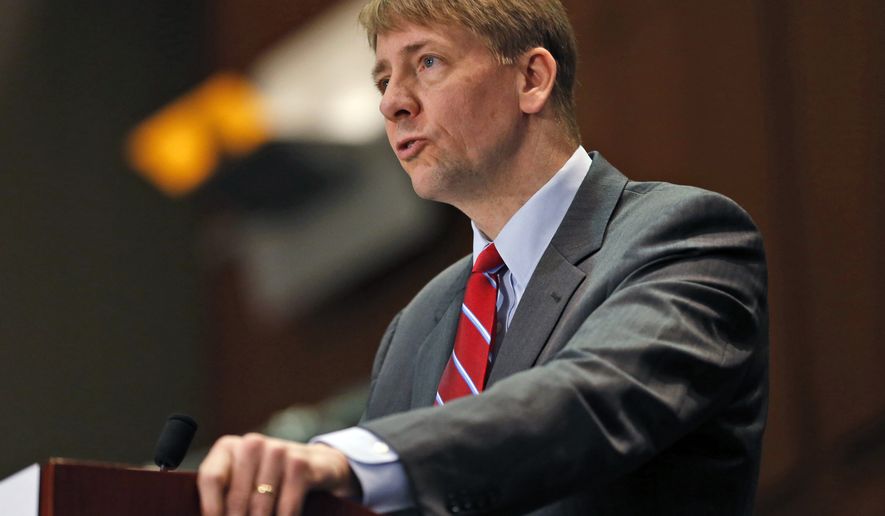President Trump acted quickly enough to install his own acting director as the head of the government’s chief Wall Street policing agency, the Justice Department said in a ruling late Saturday that appears to give the White House the upper hand in a developing battle with anti-Trump forces.
It’s unclear whether the ruling will be enough to head off a brewing constitutional crisis, with two different people now claiming to be the rightful acting director of the Consumer Financial Protection Bureau.
The previous director, Richard Cordray, a decidedly anti-Trump figure and holdover of the Obama administration, announced a new deputy director Friday then sped up his own resignation, which would normally make the deputy director, Leandra English, the acting director.
But Mr. Trump countered hours later by quickly naming his own chief manager, Office of Management and Budget Director Mick Mulvaney, as acting head of the CFPB.
“We believe this action is consistent with that long-established practice,” a senior administration official said Saturday, briefing reporters as the fight was developing.
Democrats, though, are lining up behind Ms. English, saying she’s the rightful director.
At stake is one of the government’s most powerful positions at the head of the CFPB, which gives its director an incredible amount of independence. Under the 2010 Dodd-Frank law that created the bureau, the director cannot be fired except for good cause, and the CFPB’s budget is entirely independent of Congress and the president, making it impossible to rein the bureau in.
That was by design. Democrats, who wrote the Dodd-Frank legislation, wanted to prevent any interference with the CFPB’s attempts to punish or otherwise control big financial interests.
Republicans, who largely voted against the Dodd-Frank law, say the CFPB is not only a bad idea but also illegal. A federal appeals court has agreed with them, ruling the overwhelming power of one individual to be unconstitutional — though that ruling is stayed pending another appeal.
In the meantime, the fight over the next director is all the more acrimonious.
Mr. Cordray is resigning to run for governor of Ohio, according to reports, and his decision to try to lock in his hand-picked successor is tinted with anti-Trump politics.
He had gone without a deputy director for two years, then acted in his last hours to name one in Ms. English, then sped up his own departure to try to make sure she took over temporarily.
Under the Dodd-Frank law, the deputy director serves when there’s an “absence or unavailability” of the director.
That wording is very unusual, however, and the Justice Department said it doesn’t negate the federal Vacancies Act, which gives the president powers to name acting posts when someone leaves a position.
The OLC said that while Mr. Cordray’s move isn’t necessarily illegal, it is superseded by Mr. Trump’s announcement.
“When the president designates an individual under the Vacancies Reform Act outside the ordinary order of succession, the president’s designation necessarily controls,” Steven A. Engel, an assistant attorney general, wrote in the OLC’s opinion.
• Stephen Dinan can be reached at sdinan@washingtontimes.com.




Please read our comment policy before commenting.